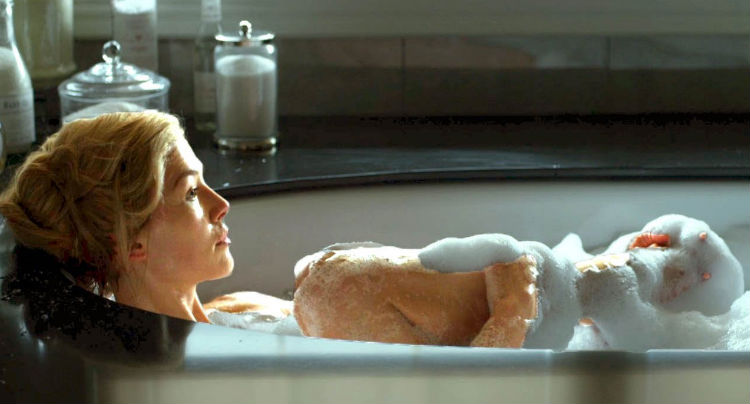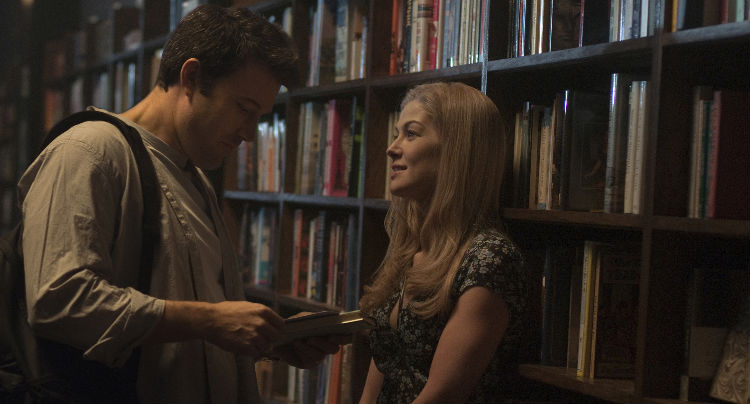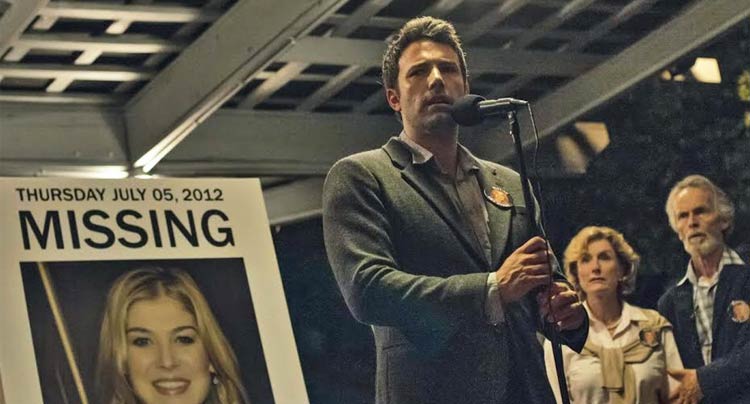
Fincher at his nastiest. A cynical examination of human nature that pushes the boundaries of discomfort.

Fincher at his nastiest. A cynical examination of human nature that pushes the boundaries of discomfort.
On the subject of David Fincher’s disturbing, fascinating Gone Girl, there are a handful of things of which I am sure, and one thing of which I’m painfully unsure. I’m sure that the film is Fincher at his nastiest and most incisive. It’s a searing, cynical depiction of the ubiquitous media circus that poisons and deludes us daily. It’s an immaculately constructed whodunnit, plays host to some of the most haunting performances of the year, and makes a bold statement about marriage.
Or does it? This is where my uncertainty lies. What is the film saying about marriage, exactly? Is it an indictment on the institution itself? A scathing critique? An extreme, but fundamentally truthful depiction? A misogynist one? Is it saying anything at all?! This is all still rattling around inside my head (Mr. Fincher’s work often has that effect), but to be sure, what’s represented here is marriage (and humanity) at its most horrific.
The film opens and we see a close-up of a husband’s hand on his wife’s pretty head, stroking her beautiful blonde hair. It’s a happy image, but the violent images conjured by the husband’s words as he speaks of “unspooling her brain” to look for answers are a demented contrast. “What have we done to each other?” he quietly wonders in voiceover.

The man is Nick Dunne (Ben Affleck), a laid-off New York journalist who moved to North Carthage, Missouri with his author wife, Amy (Rosamund Pike), to be closer to his parents. One day, Nick comes home to find his wife missing and calls the police. There are signs of a struggle–a shattered glass table, some traces of blood–but nothing conclusive. In fact, something about the crime scene feels odd, though the police can’t put their finger on it.
As Nick gets engulfed in the media firestorm that erupts following Amy’s disappearance (she was the inspiration for her parents’ widely popular children’s book series “Amazing Amy”), we’re shown a series of flashbacks that chronicle the couple’s history before Amy vanished. They were smitten, at first awakening in each other the kind of lustful spontaneity that compels people to have sex in the back of a book store (a compulsion to which Nick and Amy gave in more than once). But as the years went on and they moved to Missouri, they began to drift out of sync. Sex was electric, now it’s routine. Conversations were stimulating, now they’re detached. Nick was supposed to have a job by now, and Amy wasn’t supposed to be so controlling. They expected so much more.
What propels Gone Girl and makes its 149 minutes fly by so quickly is its intricately designed murder-mystery plot, which is so brimming with unreliable narrators, red herrings, and revelations it’s dizzying. When you feel like you’ve got a solid grasp on the characters’ motivations and the facts surrounding Amy’s disappearance, the film throws you for a loop and kicks you in another direction. Gillian Flynn, who wrote the book on which the film is based and adapted it to screen, tells a story that’s entertaining, engrossing, and wickedly funny on the surface, but has a big steaming pile of dark social and psychological commentary bubbling underneath it all.
That brings us back to the thing about Gone Girl I can’t seem to un-stick from my brain: The film’s depiction of marriage. Nick and Amy’s descent from happy Manhattan sweethearts to resentful shells of themselves drowning in the muck of dreary, small-town married life is tragic and unsettling. When people’s hearts are betrayed and love is lost, we’re capable of dreadful, dreadful things. Is modern marriage a deadly trap we fall into that forces us to falsify our identities to please one another? I don’t believe so, but each issue faced by Nick and Amy is informed by indisputable truths about modern marriage. Perhaps there are no grand statements being made about marriage and Flynn’s merely mining our deepest marital fears for entertainment value, but some key moments of abuse (emotional and physical) feel frighteningly poignant.
The absurdity of media and its defamatory nature is conveyed most memorably by Fincher and cinematographer Jeff Cronenweth’s imagery: We see Nick wearing a strange smile as he poses for photographers in front of his wife’s “missing person” poster; We see him standing at the top of the stairs in his McMansion at night, flickers of camera flashes from the paparazzi outside piercing the darkness and lighting him up in a haunting, ghost-like manner. Every move, every smile, every subtle gesture Nick makes in the public eye is scrutinized, and he soon comes to realize that public perception defines him. Tyler Perry plays Nick’s hotshot lawyer, who further instills in him the importance of this philosophy.

Fincher’s unique gift is his ability to use environments to communicate specifically his characters’ state of mind. When they’re depressed, lost, or their spirit is decayed, he bathes them in nauseating, mustardy light that makes you want to take a shower. He goes to such great lengths to put us in the headspace of his characters that escape simply isn’t an option. The film’s editing is evocative as well, with the terrific opening credits sequence showing glimpses of locations around North Carthage, fading quickly to black a few beats before you’d expect. The timing feels strange and off-putting, signaling the creepiness that lies ahead. Technically, Fincher is at the top of his game here.
Take nothing away from his actors, though; Affleck and Pike’s performances are paramount. Affleck’s sensitivity in his turn as Nick is something of a revelation, and for him to disappear into the role so completely is pretty impressive, especially considering his high-profile celebrity status. Pike’s given a role that explores touchier territory and gets very, very slippery in the film’s final act, but she stays on her feet and finishes brilliantly. I won’t divulge much for fear of spoiling the experience, but it’d be fair to say she runs away with the movie.
But in a way, she’s also done a disservice. The most irksome aspect of the film is that, as a he said/she said marriage story, too much sympathy falls on the “he” side of things. The moral scale is tipped heavily in Nick’s direction, showing Amy in a considerably less favorable light. Almost every character in Gone Girl, man or woman, is a narcissistic, unlikable asshole, so at least there’s equity on that level. I do fear, though, that the film may inadvertently, unnecessarily perpetuate a misogynistic attitude toward women that makes me feel uncomfortable in the worst way, unlike the rest of the film, which makes me feel uncomfortable in the best way.